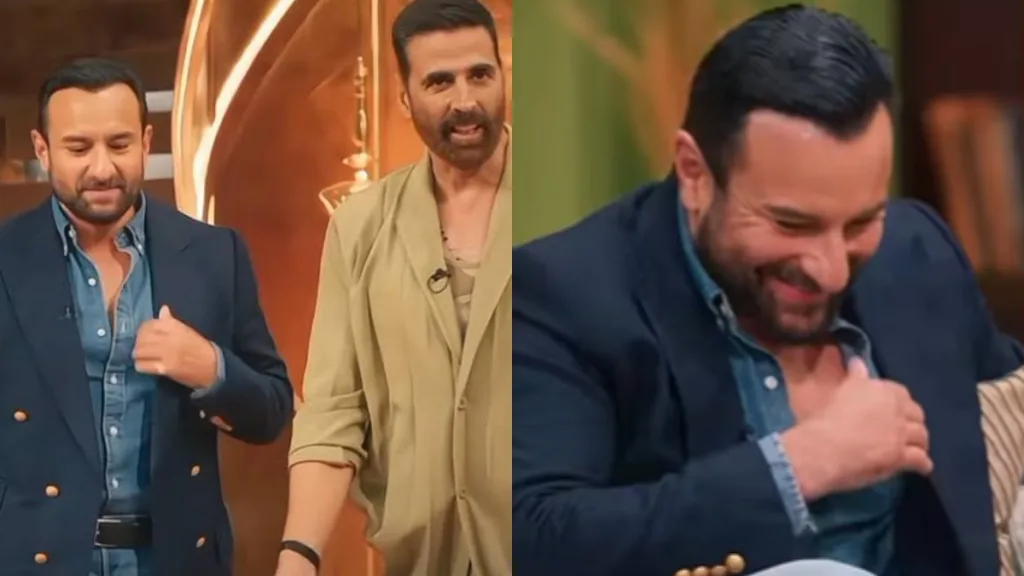In a Bollywood landscape often dominated by carefully curated public images, actor Saif Ali Khan stands out as a charmingly candid storyteller. Known for his wit and famously dry humour, Saif recently gave a masterclass in self-deprecating comedy during his appearance on the talk show Two Much, hosted by Twinkle Khanna and Kajol, where he was joined by superstar Akshay Kumar.
After a recent viral moment—a candid photograph of him playing the guitar, shared by his wife Kareena Kapoor Khan on Instagram—Saif is now making headlines for his delightfully exaggerated and hilarious account of what he jokingly refers to as his “poor” or “struggling” childhood, a perspective that is, of course, entirely unique to a Pataudi royal.
The Wallet Heist and The Sharp-Eyed Legend
The segment began when hosts Twinkle Khanna and Kajol playfully teased the actor about his famously luxurious upbringing, a childhood spent between the grand Pataudi Palace and the elite circles of Mumbai and Delhi. Saif, however, was quick to flip the script, turning the tale of privilege into a comedy sketch about necessity and juvenile mischief.
He confessed to the hosts and Akshay Kumar that, as a young boy, he developed a sneaky habit: stealing money from his late father, the Nawab and legendary cricketer Mansoor Ali Khan Pataudi. This was not a move motivated by malice, but rather a calculated risk based on his father’s busy schedule. “Because he wouldn’t notice,” Saif recalled with a mischievous grin.
However, the young schemer was no match for the true powerhouse of the family: his mother, the iconic screen legend Sharmila Tagore. The Bollywood icon, renowned for her sharp intellect both on and off-screen, always managed to catch him in the act. “But my mother would. She always knew,” Saif admitted, acknowledging his mother’s formidable perception.
When his co-guest, Akshay Kumar, probed further, asking Saif why he felt the need to pilfer cash, the actor simply quipped, “I wasn’t a very good boy; I was very naughty,”—a classic Saif Ali Khan response that downplayed the naughtiness while confirming his mischievous streak.
Saif seized the opportunity for a perfect, deadpan punchline, delivering it with impeccable comedic timing that sent everyone on the set into fits of laughter: “They weren’t feeding me.”
This exaggerated cry of neglect, coming from a member of one of India’s most illustrious families, encapsulated his unique brand of self-aware, aristocratic humour.
As Twinkle Khanna persisted in teasing him about growing up in palatial homes, Saif Ali Khan doubled down on his mock-suffering narrative. He painted a picture of grandeur that was perpetually inconvenient. “They were unpainted palaces,” he lamented, continuing the bit, “It was a big struggle. It wasn’t air-conditioned.” This hilarious framing successfully transformed his privileged environment into a source of mock-woe, making the story entirely his own.
The Legacy That Requires No Air Conditioning
Despite the playful tone and the exaggerated claims of hardship, Saif’s anecdotes always inevitably bring the conversation back to his profound and inescapable lineage. His family seamlessly weaves together Indian royalty, cinematic stardom, and cultural significance.
As the son of the late Mansoor Ali Khan Pataudi and Sharmila Tagore, Saif Ali Khan is a key figure carrying forward this grand legacy. He does so alongside his accomplished siblings, Soha Ali Khan and Saba Ali Khan, and, of course, his own immediate family, including his celebrated actress wife Kareena Kapoor Khan and his four children: the actors Sara Ali Khan and Ibrahim Ali Khan, and the younger generation, Taimur Ali Khan and Jeh Ali Khan.
The anecdotes shared on Two Much remind audiences that while Saif Ali Khan may come from a world of unearned luxury, his ability to tell a story and share a laugh about it is entirely his own. Whether he’s rocking out on his guitar or complaining about the lack of AC in his palace, his candour and charisma ensure that he remains one of Bollywood’s most captivating and entertaining voices.
The viral moments from this interview prove that even the most established stars can still draw attention simply by being refreshingly honest—or, in Saif’s case, hilariously dishonest—about their opulent lives.

